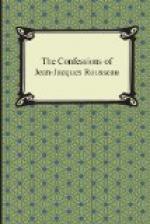to herself, and returned it. Claude Anet was
of an uncommon temper. I never encountered a
similar disposition: he was slow, deliberate,
and circumspect in his conduct; cold in his manner;
laconic and sententious in his discourse; yet of an
impetuosity in his passions, which (though careful
to conceal) preyed upon him inwardly, and urged him
to the only folly he ever committed; that folly, indeed
was terrible, it was poisoning himself. This
tragic scene passed soon after my arrival, and opened
my eyes to the intimacy that subsisted between Claude
Anet and his mistress, for had not the information
come from her, I should never have suspected it; yet,
surely, if attachment, fidelity, and zeal, could merit
such a recompense, it was due to him, and what further
proves him worthy such a distinction, he never once
abused her confidence. They seldom disputed,
and their disagreements ever ended amicably; one,
indeed, was not so fortunate; his mistress, in a passion,
said something affronting, which not being able to
digest, he consulted only with despair, and finding
a bottle of laudanum at hand, drank it off; then went
peaceably to bed, expecting to awake no more.
Madam de Warrens herself was uneasy, agitated, wandering
about the house and happily—finding the
phial empty—guessed the rest. Her
screams, while flying to his assistance, alarmed me;
she confessed all, implored my help, and was fortunate
enough, after repeated efforts, to make him throw
up the laudanum. Witness of this scene, I could
not but wonder at my stupidity in never having suspected
the connection; but Claude Anet was so discreet, that
a more penetrating observer might have been deceived.
Their reconciliation affected me, and added respect
to the esteem I before felt for him. From this
time I became, in some measure, his pupil, nor did
I find myself the worse for his instruction.
I could not learn, without pain, that she lived in
greater intimacy with another than with myself:
it was a situation I had not even thought of, but
(which was very natural) it hurt me to see another
in possession of it. Nevertheless, instead of
feeling any aversion to the person who had this advantage
over me, I found the attachment I felt for her actually
extend to him. I desired her happiness above
all things, and since he was concerned in her plan
of felicity, I was content he should be happy likewise.
Meantime he perfectly entered into the views of his
mistress; conceived a sincere friendship for me, and
without affecting the authority his situation might
have entitled him to, he naturally possessed that
which his superior judgment gave him over mine.
I dared do nothing he disproved of, but he was sure
to disapprove only what merited disapprobation:
thus we lived in an union which rendered us mutually
happy, and which death alone could dissolve.
One proof of the excellence of this amiable woman’s
character, is, that all those who loved her, loved
each other; even jealousy and rivalship submitting
to the more powerful sentiment with which she inspired
them, and I never saw any of those who surrounded
her entertain the least ill will among themselves.
Let the reader pause a moment on this encomium, and
if he can recollect any other woman who deserves it,
let him attach himself to her, if he would obtain
happiness.




